2025.11.17. Invited Lecture at Jeju Development Corporation, Happy Dialogue (7) Jeju
Hello. Today, Sunim gave an invited lecture to employees of Jeju Development Corporation, and in the evening, he held a Happy Dialogue lecture at Seogwipo Arts Center.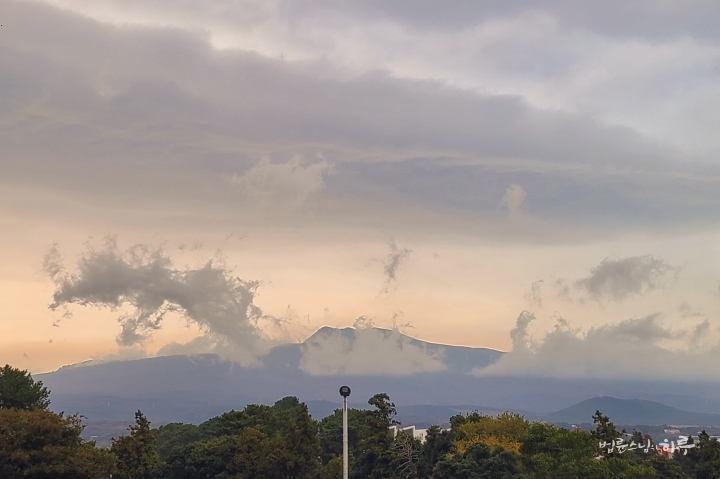
After completing morning practice and meditation, Sunim had breakfast at his accommodation and took a walk along the nearby beach. After lunch, he departed for Jeju City at 1:30 PM.
After an hour’s drive, he arrived at Jeju Development Corporation at 2:30 PM. Before the lecture, he met with President Baek Kyung-hoon for tea and conversation.
As they conversed, it was time to begin the lecture. They moved together to the main auditorium in the office building. At 3 PM, Sunim began his lecture for the employees of Jeju Development Corporation. He started the dialogue by introducing how this lecture came to be.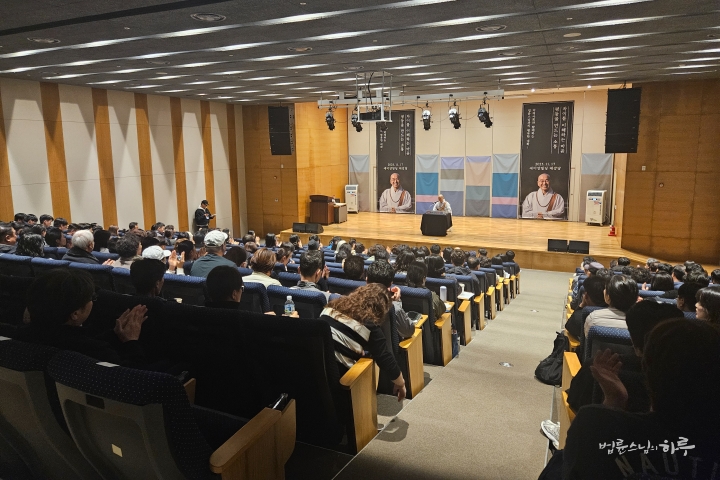
“I don’t usually give lectures at private companies. I give all my lectures for free. I don’t give paid lectures. Although I receive many lecture requests, most are difficult to accommodate. However, I believe those who work for the public good, such as soldiers, police officers, and civil servants, need encouragement. So I try to give lectures at such places whenever time permits.
But there’s a rather special story behind how I came to give a lecture at Jeju Development Corporation. Previously, Director Jung Ji-young came to me asking for help when making a film about the April 3rd Incident. At that time, I heard that Jeju Development Corporation was sponsoring the film production, which stayed in my memory. Later, when I saw ‘Jeju Development Corporation’ on my lecture request list, I said, ‘If I go to Jeju, let’s do it then,’ and that’s how this event was arranged.
When I look at problems, I don’t approach them from ethical or moral standards. I view them from only one perspective.
‘This person is suffering from this problem right now. How can I help this person escape from that suffering?’
Let me give you an example. Let’s imagine a situation where a thief is caught stealing and runs away, and the police chase after him. What would be the thief’s wish? ‘Please don’t let me get caught.’ What about the police officer’s wish? ‘Please let me catch him.’ In this situation, do you think ‘The bad guy should be caught’? But compassion isn’t like that. Compassion means considering both people’s difficulties as equal.
Then how can both people’s problems be resolved? If Avalokitesvara Bodhisattva manifested as the thief and allowed himself to be caught by the police, both the thief’s problem and the police officer’s problem would be solved. This is the spirit of sacrificing oneself to save others. Jesus was such a person. By carrying the cross himself, he sought to bear the world’s suffering. Today’s gathering is not about discussing any problem from an ethical or moral perspective. With that said, let me take your questions.”
For the next hour and a half, seven people asked questions. One of them asked how to maintain peace of mind when facing things that don’t work out no matter how hard you try.
How Can We Find Peace of Mind in the Face of Things We Cannot Control?
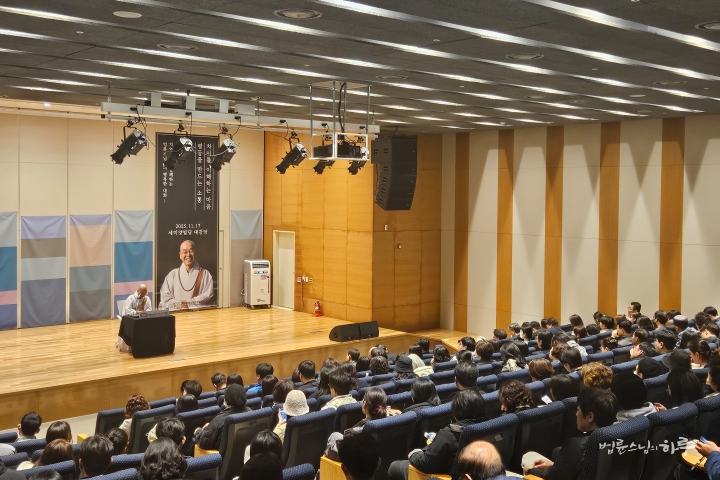
“Our mental functions can be broadly divided into two categories. While the boundary isn’t clearly defined, we can generally distinguish between ‘thoughts’ and ‘mind.’ We often say the ‘mind’ is in the heart and ‘thoughts’ are in the head, but actually both are functions of the brain. Thoughts are mainly activities of the cerebrum, especially the cerebral cortex. Psychologically speaking, thoughts are conscious functions, while the mind is influenced by the unconscious.
Let me put it more simply. When we repeatedly do something, we become familiar with it, right? This state of becoming familiar is what we call becoming ‘habituated’ or ‘automated.’ This automated state is the ‘mind.’ The mind’s functions occur automatically. And thoughts are what we consciously do, wondering ‘Should I do this? Or that?’
Let me give an example. If you see a woman and are instantly attracted because she’s beautiful, this isn’t a thought but a function of the mind. But what do thoughts do at that moment? They tell you not to look. Why? Because your wife is next to you. (Everyone laughs) Based on past experience, thoughts warn you, ‘You’re going to get in trouble when you get home.’ But the mind keeps being drawn in that direction. This is the difference between mind and thoughts. 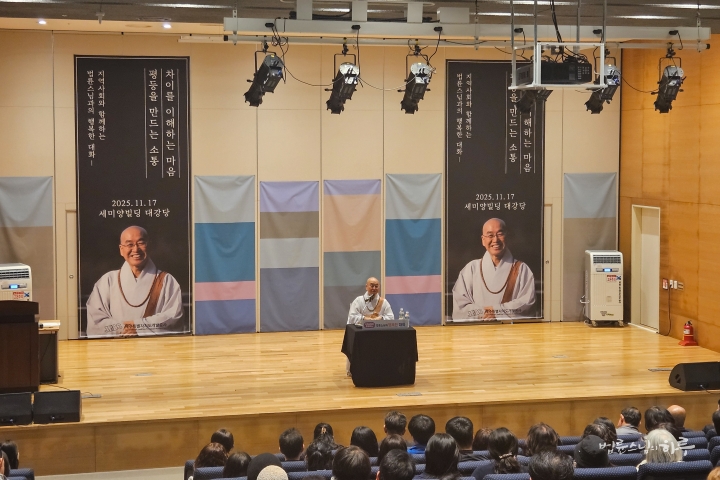
Let me give you another example. When a child has an exam tomorrow and decides, “I must stay up all night studying today!” – that’s a thought. But what about the mind? The mind doesn’t want to study. That’s why the child feels sleepy. So the child asks their mother, “Mom, I’m so sleepy. Let me sleep just a little and then I’ll study. Since I have an exam tomorrow, please wake me up at midnight.” But when the mother tries to wake the child at midnight, the child won’t get up. “It’s okay, let me sleep just a little more and then I’ll study.” That’s how it goes. Even when the mother says, “You asked me to wake you up!” the child mumbles something between sleep talk and defiance: “No, I said it’s fine…” Eventually, the mother says, “Don’t blame me tomorrow morning!” and the child responds, “Yes, I won’t say anything like that,” and falls back asleep. But when the child wakes up in the morning, they cry and make a fuss about not being woken up. Like this, deciding “I should study!” is a function of consciousness. When we fall asleep, consciousness rests and the unconscious takes over. That’s why the child, in their sleep, has almost no thought about needing to study and can barely hear what their mother is saying.
But we’ve all experienced the opposite situation at least once. Tomorrow morning, the child needs to go on a picnic with a friend they really like. They need to leave at 4 AM. The child asks their mother:
“Mom, I need to leave at 4, so please wake me up at 3.”
“You won’t be able to get up, will you?”
“No, I have to go!”
So when the mother goes to wake the child at 3 AM the next day, the child is already awake. (Everyone laughs) Why is that? Because the desire to go on the picnic is a function of the unconscious, that desire continues to work even while sleeping. That’s why the child naturally opens their eyes. This is the difference between thought and mind.
When we say something is “familiar,” the prime example is habit. We can express this habit in other words as “occurring unconsciously.” When you ask someone who suddenly got angry why they did it, most answer, “I did it without realizing.” What happens “without realizing” can be expressed as “happening unconsciously” or “doing it habitually” – they’re all actually the same thing. This is precisely “ignorance” (無知). Because we don’t know this in our conscious state, we say it happens automatically.
Many of your temperaments and habits occur automatically. When we look at our lives, there are far more unconscious actions than conscious ones. For example, food digestion and the functioning of endocrine glands all happen automatically. At most, what we can consciously control temporarily is limited to raising or lowering our arms, walking, or briefly holding our breath. Only these few things can be controlled by consciousness; everything else is governed by the unconscious. That’s why when our mind is upset, our internal organs are also affected. When our mind is upset, first of all, we can’t digest food. This is because digestion is influenced by the unconscious. 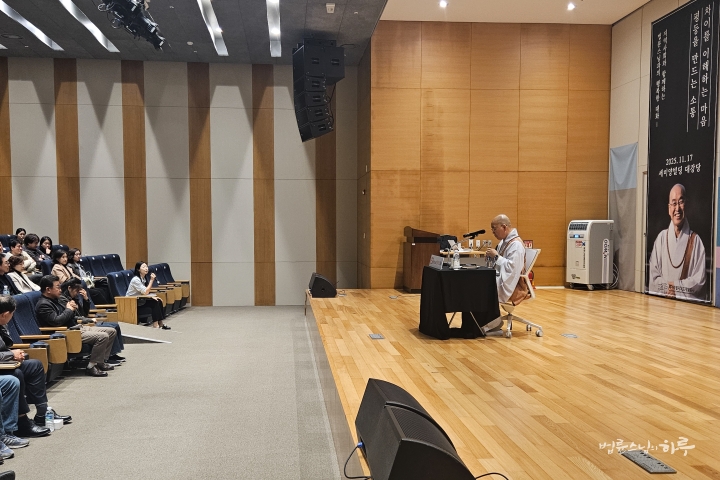
Making resolutions or determinations doesn’t help much in changing habits. In other words, it hardly helps in fixing a temperament prone to anger or irritation. This is because no matter how much you resolve or determine, it’s still a function of consciousness. When you encounter a certain situation, the unconscious automatically reacts first. This reaction happens so quickly that consciousness can’t even notice it in time.
You’ve probably heard the term ‘awareness.’ It’s also called ‘mindfulness.’ It means instantly recognizing when you’re angry, or instantly recognizing when greed arises. When you become aware like this, you can control it to some extent, but most of us get angry without even noticing. Then what we can do is grit our teeth and endure while already in an angry state. Enduring is a function of consciousness. Sometimes we barely manage to endure this way, and sometimes we can’t. We keep repeating this pattern.
When do we feel stress? It mostly occurs when the mind is suppressed. We feel stress when we can’t do what we want to do, or when we’re forced to do what we don’t want to do. When things don’t go our way, anyone feels stress. Enduring and suppressing is also stress. So to overcome stress on your own, you need to do things ‘willingly.’ It’s not something that can be achieved through resolution or determination. When you need to wake up in the morning, don’t think ‘I should get up!’ – just jump up when the alarm rings. When you’re thinking ‘I should get up!’ are you in a state of being up? Or are you still lying down? When you’re resolving ‘I should get up!’ it means you’re still lying down. Even if you make resolutions and determinations a hundred times while lying down, you’re still just lying down. You can’t get up with resolutions and determinations alone. So don’t resolve, don’t determine – when the alarm rings, just jump up. Once you’re up, there’s no need to resolve ‘I should get up!’ You’re already up, so what’s there to resolve or determine?
That’s why practitioners have the motto ‘Just try it first.’ Just try getting up first. Just try doing it first. Just try stopping first. Don’t hesitate thinking ‘I should stop this…’ or ‘I should do this…’ – when you need to stop, just try stopping first. Let’s see what happens after trying. You need to examine yourself while doing this. But most modern people are always resolving, determining, and making efforts. However, these resolutions, determinations, and efforts actually cause stress. Animals rarely have such resolutions, determinations, or efforts. That’s why they generally don’t have much stress. But nowadays, even animals are confined in small spaces and prevented from living according to their nature, so livestock also experience stress. That’s why livestock have many diseases. The biggest cause of disease is stress.
If you want to live without stress, you should just live doing what you want to do. But does the world ever go exactly as we want? There are many times when we can’t do what we want to do, and have to do what we don’t want to do. That’s why we feel stress. So what is practice? The path isn’t only about being able to do what you want. You should also be able to not do what you want to do. Not by enduring and suppressing, but by willingly not doing it, and you should also be able to willingly do what you don’t want to do. When you train in these two things, stress decreases significantly. If you want to do something, do it; if the situation doesn’t allow it, it’s fine not to do it; if you don’t want to do something and can avoid it, don’t do it; if it’s a situation where you must do it, just do it even if you don’t want to. For example, even if a farmer feels a bit achy and doesn’t want to work, if it suddenly starts raining, he must jump up and gather the grain from the yard. But if he thinks ‘I’m dying of pain, why does it have to rain?’ he’ll keep feeling stressed. 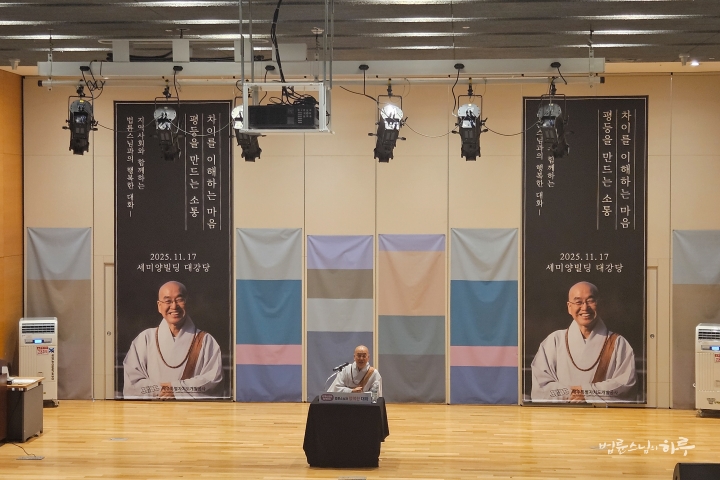
So what I want to tell you is: First, you need to practice ‘awareness.’ You need to be aware of your current state as it is. Second, you need to practice ‘doing things willingly.’ Try doing anything lightly, just give it a try. That’s why at practice centers, they keep giving us Words to Remember like ‘Do it willingly,’ ‘Do it lightly,’ ‘Just try it.’ When you actually practice this, you’ll realize that everything we find difficult comes from our minds. We suffer because we’re caught up in the thought ‘I don’t want to do it,’ but when we actually do it, it’s no big deal. For example, if your father says, “Son, put the calf on the roof,” most people would immediately react, “Don’t say such nonsense!” But what does ‘doing it willingly’ mean? It means at least trying to lead the calf to the base of the roof. Then you can tell your father, “Father, I brought the calf here, but I really can’t get it up on the roof.” Then what would your father say? “Is that so? Then go tie it back up.”
Like this, just because someone tells you to do something doesn’t mean you have to do everything, and there’s no need to refuse from the beginning. What’s important is taking the first step and asking about the next step. If you have this attitude, you can significantly reduce stress. But you all keep trying to solve problems by enduring, resolving, and deciding with your thoughts, which actually creates more stress.”
In addition, there were the following questions:
After injuring one arm in an accident, I’ve become conscious of others’ gazes. I’m curious about how to naturally accept these looks and maintain my self-esteem.
How should I explain my youngest child who has autism to their siblings, and help them naturally accept the differences?
I have many concerns about letting go of desires. What’s the difference between letting go after achieving something and giving up from the beginning?
I keep recalling the past and feeling regret or making comparisons. I’m curious about how to age gracefully.
Scientifically speaking, I’ve heard our bodies are mostly empty space. Then isn’t this world we live in meaningless?
The concept of reincarnation, that humans are reborn, doesn’t seem scientific to me. What is the concept of reincarnation in Buddhism?
After finishing the lecture with loud applause, Sunim immediately moved to the evening lecture venue at Seogwipo Arts Center. When Sunim arrived at the venue, volunteers were warmly welcoming Jeju citizens everywhere.
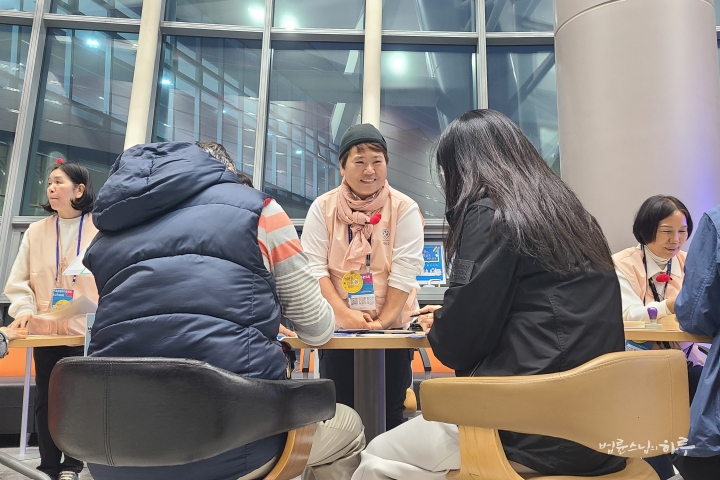
Arriving at the venue at 6:50 PM, Sunim had tea in the waiting room with the Mayor of Seogwipo, the Director of Culture, Tourism and Sports, the Director of Seogwipo Arts Center, and the Performance Planning Team Leader.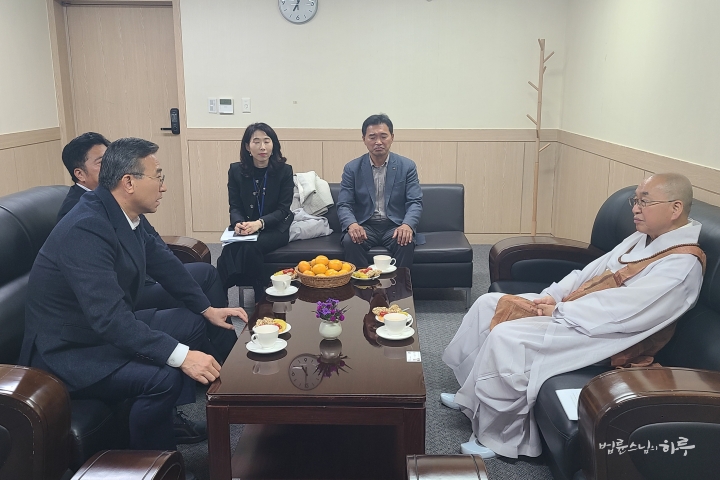
After tea, when lecture time arrived, they moved to the auditorium together. In the auditorium, as a pre-performance, Ms. Lee Hana, representative of the fusion Korean traditional music band Wonyul, was giving an exciting Korean traditional music performance.
At 7:30 PM, Sunim took the stage amid loud applause. About 700 people filled the auditorium. Leaving the applause and cheers behind, the Dharma Q&A began in earnest.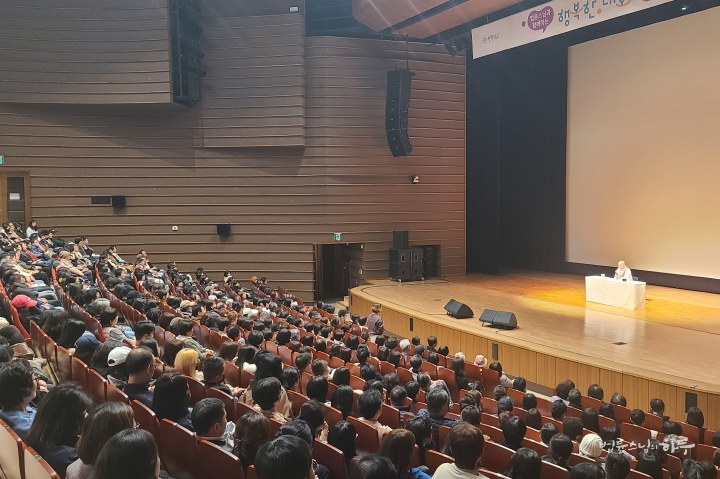
Five people who had applied for questions in advance first had conversations with Sunim, then impromptu questions were taken from the audience. Over two hours, a total of ten people asked Sunim questions. One of them asked about how to endure the resentment and sadness remaining in their heart after losing their beloved son.
I lost my son in an accident and am living in anger and resentment. How should I live?
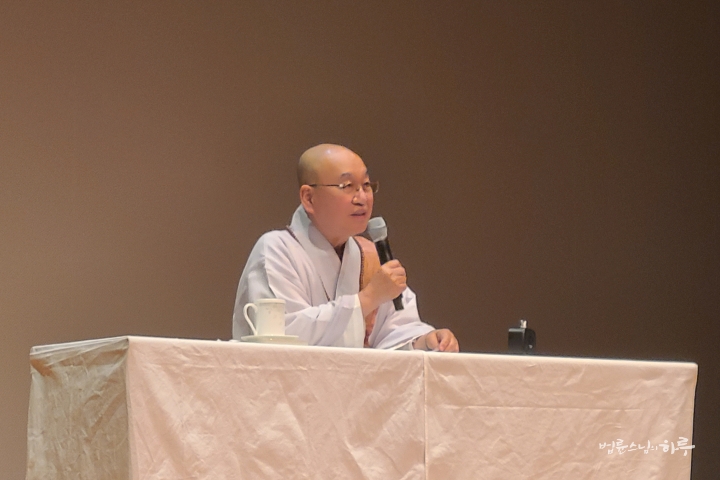
“Your beloved son died, so should you alone live happily? Of course you should grieve too. Even if you can’t die, shouldn’t you grieve as if you’re dying? So grieve more. Only six months have passed, and you’re already trying to escape from grief – isn’t that too soon? You should grieve for about 10 years. If a father becomes fine after just six months when his beloved son died, how would the child feel? Wouldn’t he think, ‘Dad didn’t care about me’? Only if you cry and wail for about 10 years would the child feel, ‘Ah, Dad loved me.’ What do you think?”
“But I’m the head of the family. If I fall into despair and keep showing my sadness to my wife and daughter, wouldn’t I be abandoning my responsibility?”
“Your son died – what’s so important about being the head of the family? If you grieve for 10 years, your work life will become difficult, and you’ll lose your job soon. Your wife will eventually need psychiatric treatment. Your daughter will need to continue counseling as she grows up. Then even though you’re all alive, you’ll be in a state like death, won’t you? Then won’t you follow your son? Is there another way? The path is obvious, isn’t it?
The more you’re immersed in grief, the greater your wife’s guilt will become. If mom and dad are sad, your daughter will become more depressed. If you scold the child saying ‘Why didn’t you play with your brother?’, ‘Why didn’t you take better care of him?’, the rest of the family will all leave too. The family members can only say, ‘It was an accident, what do you want me to do? Did I know an accident would happen?’
If you think like this, how would the families of the Sewol ferry victims live? What about the Itaewon disaster? Does it make sense that people went out to have fun and 150 people died slipping in an alley? Yet such things happened in this world. So one child dying in an accident is not something that ‘absolutely cannot happen.’ I also thought when I saw the Sewol ferry and Itaewon disasters, ‘How could such things happen?’ An accident where two or three people die slipping in an alley could happen. If a million people gather to pray in Mecca or India and a building collapses killing 50 to 100 people in a stampede, that seems possible. But so many people being crushed to death in a Korean alley doesn’t make common sense. Yet such things happen in the world we live in.
Your son’s accident also happened as just an ‘accident,’ regardless of your intentions. But if your life is trapped in sadness and resentment because of that accident, your wife lives in guilt, and your daughter is depressed, it doesn’t end with just one child dying. Within a few years, the whole family will either follow in death or live a life that isn’t really living. Then would your dead son look at his family from heaven and think, ‘Right, since I died, my family shouldn’t live well. Let’s all die together!’? Or would he hope, ‘Even though I died in an accident, mom, dad, and sister should live well’? In the end, you have no choice but to choose. Your crying won’t bring your son back to life, will it? That’s certain, right?”
“That’s right.”
“Then you have to choose one of two things. Will you follow your son in death? Or will your son have departed but the remaining family live happily?
If you think ‘How can I live happily when my son died?’, then live depressed and die. Since you say you’re Catholic, let me tell you a Bible story. Is making a person’s hair white or black within human ability? Or is it God’s domain?”
“I’m not devout so I don’t know exactly.” (Everyone laughs)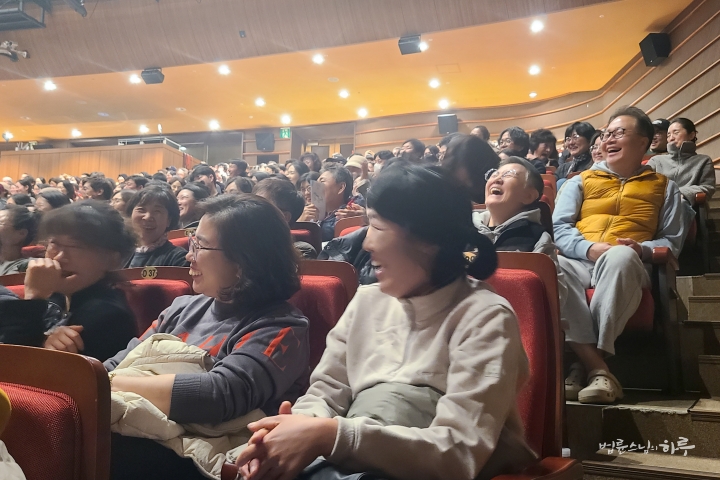
“Haven’t you read the passage that says even making a person’s hair white or black is done by God?”
“No.”
“Then in Catholic faith, is human birth and death in the human domain? Or God’s domain?”
“God’s domain.”
“Then as a Catholic, you’re dissatisfied with what God does?”
“I understand it intellectually but can’t accept it emotionally.”
“Then honestly say, ‘My faith was shaken because my son died.’ I believed God does everything, but when my son died, I thought ‘Even if it’s God, I can’t accept doing things this way. So I’ll abandon my Catholic faith.’ That’s fine. But if you’re going to keep your Catholic faith, since it says human birth and death are done by God, when this happens you should accept it saying ‘Thy will be done.’ This is faith. Going to church doesn’t make you Catholic. Even if something is absolutely unacceptable, when it comes to you, willingly accepting it saying ‘Thy will be done’ is faith.
This faith isn’t bad. Thanks to this faith, people who lost children live with hope, and people whose parents died live with hope. If this is unavoidable, you should say ‘Thy will be done.’ In Buddhist terms, it’s accepting what has already happened as ‘karmic conditions.’
You’re not accepting what has already happened. If you accept it, your family can live happily again. If you ultimately can’t accept it, the remaining family can only follow that path. If you accept it saying ‘Thy will be done’ and live with hope, what will happen to your wife’s guilt?”
“It seems it would decrease.”
“Then, if dad and mom get better, what will happen to your daughter?”
“She’ll get better.”
“Then would it be better to choose the path where the family gets better? Or the path where they get worse?”
“The path where they get better is good.”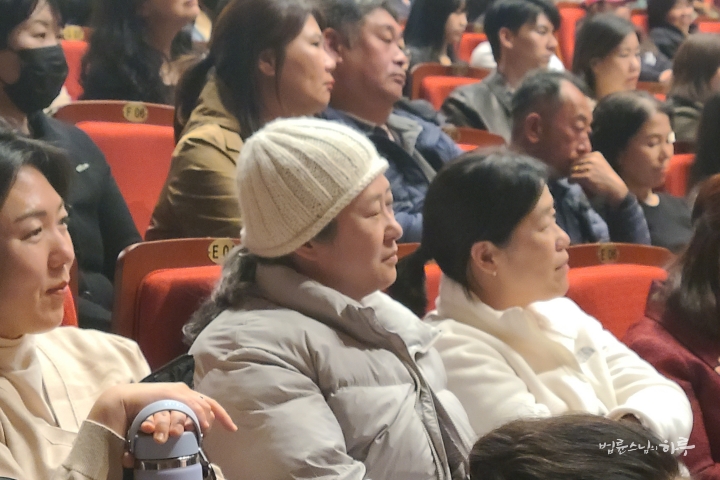
“But right now you don’t want that path? Then do as you please. What can we do if you don’t want to go? Will you follow your son in death? Or will you come to your senses someday?”
“I need to come to my senses.”
“You need to come to your senses someday, but if you come to your senses after 5 years, your daughter will be in sadness during those 5 years of growth. Then even if you come to your senses, your daughter might already be in serious depression. Is it better to sacrifice one person’s life and then come to your senses? Or come to your senses now?”
“Now is better.”
“Then come to your senses now. Why do you say ‘I understand but I can’t do it’? ‘Can’t do it’ here doesn’t mean there’s a problem. If you can’t do it, the suffering increases; if you can do it, the suffering decreases. So do as you please.”
“I understand. Thank you.” (Everyone applauds)
“Is this easy? Or difficult? Generally, it’s really difficult. That is, from a foolish perspective, it’s difficult. But from the perspective of wisdom, it’s not difficult at all.
When two people live together and one dies, there’s the path of following them in death thinking of that person, and there’s the path of living more confidently saying ‘I’ll live your share too.’ Which path to take is my choice. Whether to go to a bright place or a dark place isn’t predetermined – I choose now.
For example, let’s say someone kidnapped me and forcibly injected me with drugs to make me engage in prostitution. Then after a year I was rescued and returned home. Since I did drugs for a year, I’d be addicted to drugs, right? So if I touch drugs again, will I be punished? Or would I be considered innocent? I started involuntarily by force, but if I seek drugs now, that’s ‘my choice’ now. If I do drugs again, I become a drug criminal. Will you say it’s not my responsibility because of the people who forced drugs on me? Regardless of what others did, if I’m in a state of drug addiction now, I need to quit drugs myself for my life to be renewed. Saying ‘Unless those people come to me to reflect and apologize, I’ll continue doing drugs’ is foolish behavior. Whether they forced me or I started voluntarily, which path to take from now on is entirely my choice.
If you choose to take the bright path, you go on the bright path. If you keep resenting and remain trapped in the past, you go on the dark path. Buddha’s teaching isn’t about ‘What was your past life like?’ Right now, at this moment, ‘Will I take the bright path with wisdom? Or the dark path with foolishness?’ Among these two, it’s good to take the wise path. The teachings of other sages are all the same.”
“I’ll live according to the answer I already knew, more diligently, grieving just a little. Thank you.” (Everyone applauds)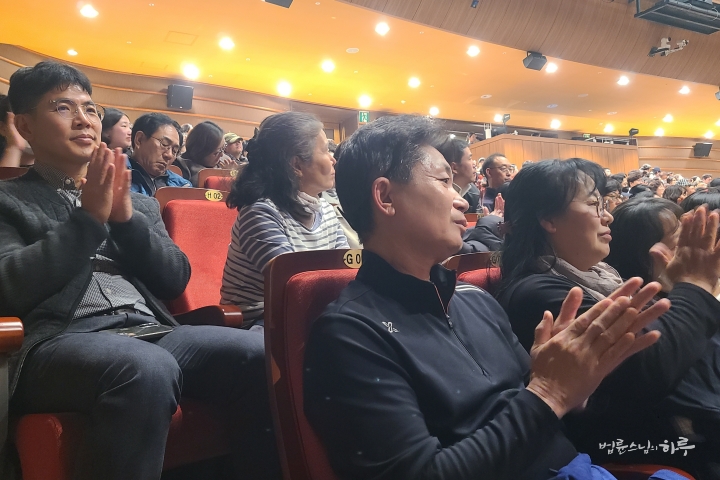
In addition, there were the following questions: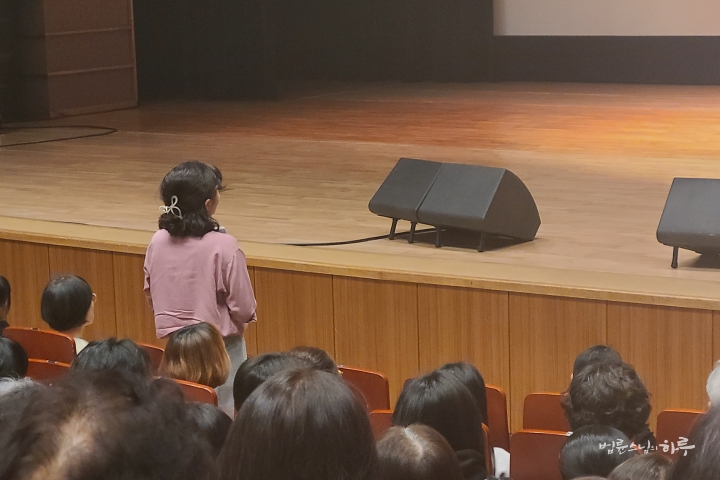
I’m caring for a child with autism. It’s becoming too difficult to handle, but I feel guilty about sending them to a facility, making the decision difficult.
My daughter has talent in sports but gives up easily. How should I guide her direction?
I’m living as a DINK (Dual Income No Kids) couple due to infertility, and sometimes anxiety rises up.
I’m a father with two children and a wife. My wife left home with the kids saying it was too hard, and my business has also become difficult. I keep having thoughts of wanting revenge on the neighbor who ruined me.
I have financial stability, but I want to live a more meaningful life after retirement. How should I live going forward?
Is there a way to preserve Jeju’s environment while also reviving the economy?
I treat my daughter well, but sometimes I think, “You’re lucky to have a mother like me.” Am I strange?
I want to live a new life after middle age, but I have many thoughts and can’t put them into practice. How should I set my direction?
As we conversed, it was time to wrap up. Sunim gave closing remarks.

“You invested two hours, don’t you feel it was a waste?”
“No.”
“That’s good. Everyone, if you think of something as a problem, then nothing is not a problem. However, if you look at it with a broader perspective, there is nothing that needs to be a problem. In Buddhism, clinging to something as a problem is called ‘form (色)’, and realizing that nothing needs to be a problem is called ’emptiness (空)’. That’s why we say ‘form is emptiness, emptiness is form.’ If you make something a problem, it becomes a problem; if you don’t make it a problem, there’s nothing problematic about it. What’s important is which choice I make among these. My destiny is in my own hands, not determined by anyone else. Jesus also said, ‘The truth will set you free.’ This means that when you realize the truth, you become free from such bondage.”
The lecture ended with loud applause. Immediately after, there was a book signing session in the lobby. Many citizens lined up to greet Sunim and express their gratitude.

After finishing the book signing, Sunim took a commemorative photo with the volunteers who had prepared for the lecture.
Sunim expressed his gratitude to the volunteers, then left the lecture hall and headed to his accommodation. He arrived at the accommodation at 11 PM, had a late dinner, and concluded the day’s activities.
Tomorrow, he will depart from Jeju Airport and arrive at Cheongju Airport, then immediately travel to Yeongdong, Chungcheongbuk-do to attend a religious gathering for national peace and reconciliation. In the evening, he is scheduled to give a “Happy Dialogue Q&A” lecture in Goyang City.





